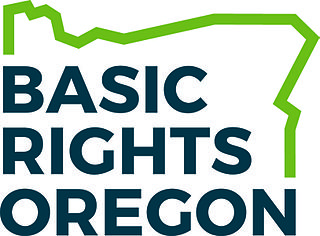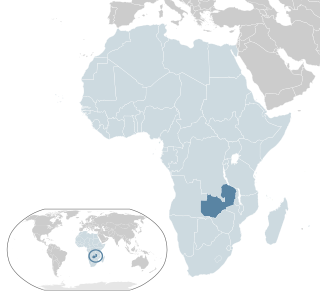Romer v. Evans, 517 U.S. 620 (1996), is a landmark United States Supreme Court case dealing with sexual orientation and state laws. It was the first Supreme Court case to address gay rights since Bowers v. Hardwick (1986), when the Court had held that laws criminalizing sodomy were constitutional.

Ballot Measure 9 was a ballot measure in the U.S. state of Oregon in 1992, concerning gay rights, pedophilia, sadism, masochism, and public education, that drew widespread national attention.

Ballot Measure 36 was a 2004 initiative in the U.S. state of Oregon. It amended the Oregon Constitution to define marriage as a union of one man and one woman. The initiative passed with 1,028,546 votes in favor, and 787,556 votes against in the November 2, 2004 general election. It is one of a number of U.S. state constitutional amendments banning same-sex unions.

Basic Rights Oregon is an American nonprofit LGBT rights organization based in Portland, Oregon. It is the largest advocacy, education, and political organization working in Oregon to end discrimination based on sexual orientation and gender identity. Basic Rights Oregon has a full-time staff, a contract lobbyist, and more than 10,000 contributors, and 5,000 volunteers. It is a 501(c)(4) organization that maintains a 501(c)(3) education fund, a state candidate PAC and a ballot measure PAC. The organization is a member of the Equality Federation.

Ballot Measure 19 was a citizen's initiative in the U.S. state of Oregon in 1994. The measure sought to amend the Oregon Constitution, limiting free speech protection for obscenity and child pornography. The measure was rejected by the voters 54.3 percent to 45.7 percent.

Lesbian, gay, bisexual, and transgender (LGBT) persons in Kenya face legal challenges not experienced by non-LGBT residents. Sodomy is a felony per Section 162 of the Kenyan Penal Code, punishable by 14 years' imprisonment, and any sexual practices between males are a felony under section 165 of the same statute, punishable by 5 years' imprisonment, but these sections are being challenged in court, with the ruling scheduled for May 24, 2019. The state does not recognise any relationships between persons of the same sex; same-sex marriage is banned under the Kenyan Constitution. There are no explicit protections against discrimination on the basis of sexual orientation and gender identity. Adoption is prohibited to same-sex couples.
Oregon Ballot Measure 37 is a controversial land-use ballot initiative that passed in the U.S. state of Oregon in 2004 and is now codified as Oregon Revised Statutes (ORS) 195.305. Measure 37 has figured prominently in debates about the rights of property owners versus the public's right to enforce environmental and other land use regulations. Voters passed Measure 49 in 2007, substantially reducing the impact of Measure 37.

Colorado Amendment 43 was a referendum approved by the voters in 2006 that added a new section to Article II of the Colorado Constitution to define marriage in Colorado as only a union between one man and one woman. It passed with 56% of the vote.

This article summarizes the same-sex marriage laws of states and similar jurisdictions in the United States. Via the case Obergefell v. Hodges on June 26, 2015, the Supreme Court of the United States legalized same-sex marriage in a decision that applies nationwide, with the possible exception of American Samoa and some tribal jurisdictions. Same-sex marriages are currently licensed and recognized in all U.S. states, District of Columbia, territories, excepting the aforementioned American Samoa and some Native American tribal jurisdictions.
Proposition 2 was a referendum for a state constitutional amendment placed on the ballot by the Texas legislature and approved by the voters at the November 8, 2005 general election. The measure added a new provision to the Texas Constitution, Article 1, Section 32, which provides that "Marriage in this state shall consist only of the union of one man and one woman", and "This state or a political subdivision of this state may not create or recognize any legal status identical or similar to marriage." Texas thus became the nineteenth US state to adopt constitutional amendment banning same-sex marriage. It was the most populous state to adopt a constitutional ban on same-sex marriage until California passed its ban in November 2008.

Section 15.11 is a provision in the Ohio Constitution that makes it unconstitutional for the state to recognize or perform same-sex marriages or civil unions. Approved as a constitutional amendment in 2004 under the name of "Issue One", it received support from 61.7% of voters.

The Constitution of Kosovo, refers to the supreme law of the Republic of Kosovo. Article four of the constitution establishes the rules and separate powers of the three branches of the government. The unicameral national Assembly of the Republic exercises the legislative power, the executive branch led by the President and the Prime Minister which are responsible for implementing laws and the judicial system headed by the Supreme court.

Lesbian, gay, bisexual, and transgender (LGBT) persons in the British Virgin Islands face legal challenges not experienced by non-LGBT residents. Same-sex sexual activity has been legal in the British Virgin Islands since 2001.
The right of foreigners to vote in the United States has historically been a contentious issue. A foreigner, in this context, is an alien or a person who is not a citizen of the United States.

Lesbian, gay, bisexual, and transgender persons in Zambia face legal challenges not faced by non-LGBT citizens. Same-sex sexual activity is illegal for both males and females in Zambia.

Ballot Measure 51 was a legislatively referred constitutional amendment on the May 20, 2008 primary election ballot in the state of Oregon. The measure amended the Oregon Constitution and was passed by the voters.
The Nebraska Civil Rights Initiative, also known as Initiative 424, was a 2008 ballot measure that proposed a constitutional amendment which would prohibit the state from discriminating against, or granting preferential treatment to, "any individual or group on the basis of race, sex, color, ethnicity, or national origin in the operation of public employment, public education, or public contracting." The measure, in effect, banned affirmative action at the state level. It passed with 58% of the vote.
The 2006 Virginia State Elections took place on Election Day, November 7, 2006, the same day as the U.S. House and the U.S. Senate elections in the state. The only statewide elections on the ballot were three constitutional referendums to amend the Virginia State Constitution. Because Virginia state elections are held on off-years, no statewide officers or state legislative elections were held. All referendums were referred to the voters by the Virginia General Assembly.














